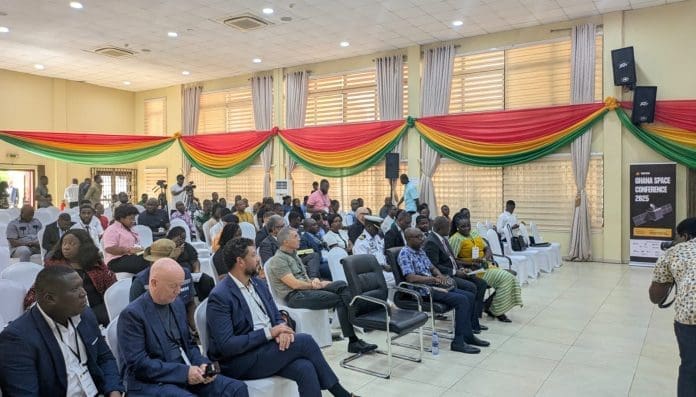Ghana opened its maiden Space Conference on October 6, 2025, at the University of Ghana, bringing together government officials, scientists, industry leaders, and policymakers to explore how space technology can address local challenges ranging from agricultural productivity to climate resilience.
The three-day conference, running through October 8, operates under the theme “Harnessing Space Technology for Sustainable Development and Inclusive Growth in Ghana and Beyond.” Participants from across Africa and internationally are examining practical applications of space science rather than purely theoretical discussions.
“Space technology can transform how we live, from using satellite data to help farmers grow more food, to improving internet access for remote schools, to tracking climate and disaster risks,” said Kwaku Sumah, Founder and Managing Director of Spacehubs Africa, a joint convenor of the conference. “It’s about using cutting-edge science to solve local challenges and improve daily life for all Ghanaians.”
The Environmental Protection Authority Ghana organized the conference in collaboration with the Ghana Space Science and Technology Institute, Ghana Meteorological Agency, University of Ghana, All Nations University, Spacehubs Africa, and Agbedus Consult. This multi-institutional approach reflects recognition that space applications cut across traditional sectoral boundaries.
Prof. Nana Ama Browne Klutse, CEO of the Environmental Protection Authority, emphasized during the opening ceremony that space applications are critical for addressing climate resilience, environmental management, agriculture, disaster response, urban planning, and trade efficiency. “Space technology is no longer a luxury; it is a necessity for Africa’s sustainable future,” she stated.
Her comments reflect shifting perspectives about space technology in African contexts. Historically viewed as expensive pursuits for wealthy nations, space applications have become increasingly accessible and relevant to developing economies through lower satellite costs, improved ground infrastructure, and growing technical expertise.
Dr. Joseph Tandoh, Director of the Ghana Space Science Institute, affirmed the need for a Ghana Space Agency. “With the approval of the Ghana Space Policy in 2022 and its launch in 2024, I believe that Ghana is laying the essential foundation to integrate space solutions into our national agenda while fostering continental collaboration,” he explained.
Cabinet approved Ghana’s Space Policy in March 2022, with the formal policy launch occurring in November 2024. The policy seeks to coordinate Ghana’s space activities and facilitate establishment of the Ghana Space Agency to lead human capital development, infrastructure growth, and overall advancement in the sector.
“The next step is to establish the Ghana Space Agency to leverage space technology for benefits to research, policy, industry as well as for the overall prosperity of the ordinary Ghanaian,” Dr. Tandoh stated, highlighting implementation challenges that follow policy approval.
Ghana has already been employing space technologies in critical areas including environmental monitoring, security, precision agriculture, navigation, weather forecasting, disaster management, and telecommunications. However, these applications remain fragmented without centralized coordination or strategic direction.
The conference is expected to strengthen partnerships between Ghanaian and international space institutions, issue policy recommendations for advancing Ghana’s National Space Policy, and increase youth participation in STEM and space entrepreneurship. These objectives address both technical and human capital dimensions of space sector development.
According to Sumah, the conference will produce published proceedings to guide national and continental action. Whether these recommendations translate into concrete policies and programs depends partly on government commitment and resource allocation beyond conference enthusiasm.
Africa’s space economy is projected to reach $22.6 billion by 2026, reflecting growing continental investment in satellite technology, earth observation, and communications infrastructure. Ghana positions itself within this expansion, competing for leadership roles alongside more established programs in South Africa, Nigeria, Egypt, and Kenya.
The maiden conference represents Ghana’s effort to establish visibility within African and global space communities. First impressions matter in sectors where partnerships, technology transfers, and collaborative projects depend on perceived commitment and competence.
Practical applications of space technology for Ghana include using satellite imagery to monitor illegal mining activities, track deforestation, optimize crop yields through precision agriculture, improve weather forecasting accuracy, and enhance telecommunications coverage in rural areas. Each application requires ground infrastructure, trained personnel, and sustained funding.
Youth engagement forms a critical conference focus, recognizing that Ghana’s space ambitions require pipeline development of engineers, scientists, data analysts, and policy experts. Current educational systems produce insufficient graduates with relevant skills, creating bottlenecks for sector growth.
Women’s participation in STEM fields generally and space technology specifically remains below parity in Ghana. Conference organizers emphasize that ensuring innovation benefits reach everyone requires deliberate inclusion strategies rather than assuming trickle-down effects.
The three-day format allows for technical presentations, policy discussions, networking opportunities, and exhibition of existing capabilities. Whether participants leave with actionable commitments or merely inspiration will determine the conference’s ultimate value beyond symbolic importance.
Ghana’s space policy development occurred relatively late compared to some African peers but potentially benefits from learning from their experiences. South Africa established its space agency in 1989, while Nigeria created its National Space Research and Development Agency in 1999, providing decades of lessons about challenges and opportunities.
The conference timing, five months into President Mahama’s administration, signals that space technology maintains priority status despite government transition. Continuity in strategic initiatives often proves challenging when political leadership changes, making sustained commitment noteworthy.
Source: newsghana.com.gh











